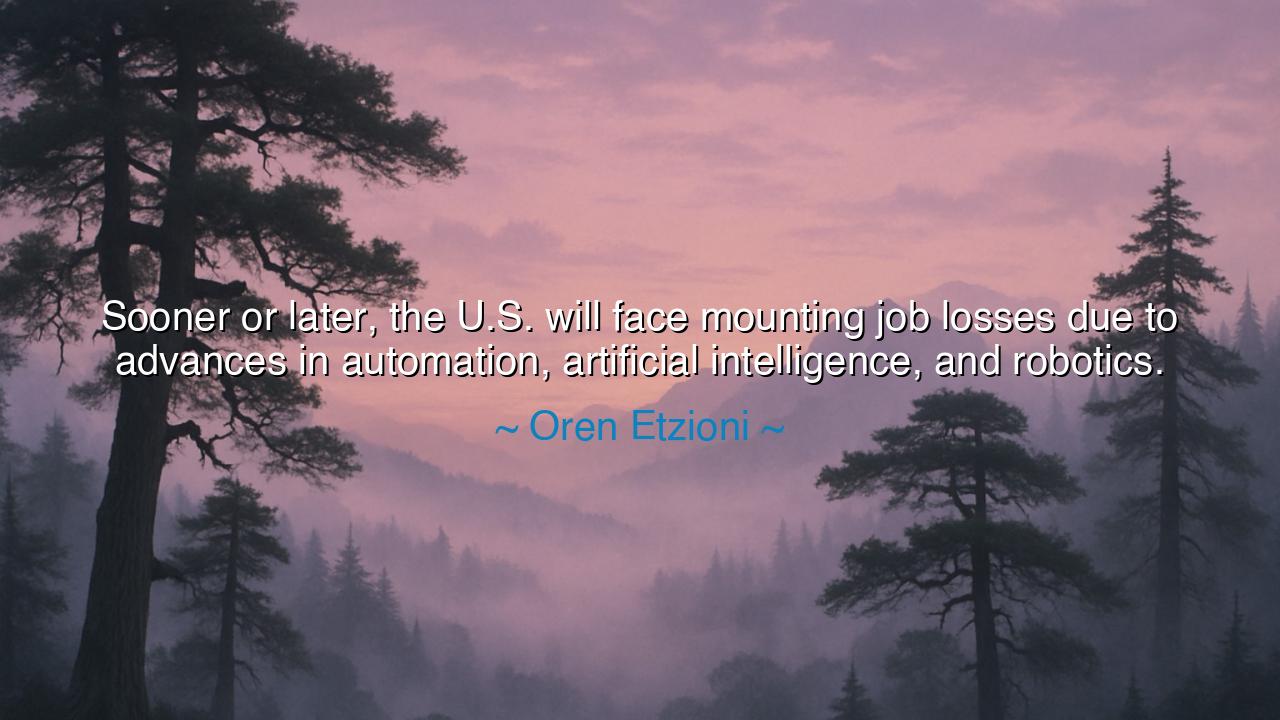
Sooner or later, the U.S. will face mounting job losses due to
Sooner or later, the U.S. will face mounting job losses due to advances in automation, artificial intelligence, and robotics.






In the age of restless progress, when steel and code began to shape the destiny of humankind, the scholar and innovator Oren Etzioni spoke with foresight and warning: “Sooner or later, the U.S. will face mounting job losses due to advances in automation, artificial intelligence, and robotics.” His words are not the prophecy of despair, but the sober voice of truth — a call to awaken the human spirit before it grows complacent in the shadow of its own creations. For every age that has mastered a new power must decide anew what it means to be human, and what work, purpose, and dignity will mean when the machines can do nearly all.
The origin of this truth lies deep in the history of labor and invention. From the earliest plow that cut the soil to the steam engines that shook the earth, every leap of technology has both freed and displaced those who came before. When the weavers of England watched the looms of the Industrial Revolution replace their craft, they rose in fear and fury, for they believed their livelihoods stolen. Yet from that same upheaval was born the modern age — one of abundance and invention, where new trades rose from the ashes of the old. So too, Etzioni’s warning reminds us that automation and artificial intelligence are but the next turning of that eternal wheel: both the dawn of new opportunity and the dusk of old certainty.
But unlike the steam or steel of centuries past, this revolution moves not through muscle but through mind. The machines of this era do not only lift burdens or forge metal — they think, they learn, they replace decisions once made by human judgment. They write, they analyze, they heal, they calculate. This power, born of human genius, now threatens to surpass its makers in many labors. And thus the challenge becomes not merely economic, but spiritual. When robots and algorithms perform tasks that once gave people purpose, what will become of the human soul that longs to be needed, that measures its worth in contribution?
The wise may look back to another moment in history — the story of the printing press. When Gutenberg’s invention spread across Europe, many scribes and priests feared it would destroy the sanctity of written knowledge. But the press did not destroy knowledge; it democratized it. Those who adapted became teachers, printers, thinkers — architects of a new world of literacy and reason. The same choice now faces our own generation. Will we fight against automation, or will we learn to shape it, to make it serve rather than enslave? For as in all ages, the tools themselves are neither good nor evil — it is the intent of their makers that gives them soul.
Etzioni’s words thus remind us that no nation, however great, can survive by clinging to the past. To resist change is to deny life itself, for all living things must evolve or perish. Yet, he also speaks to the danger of unthinking surrender — for technology without wisdom leads to imbalance, and progress without compassion becomes tyranny. If machines take our labors, we must not let them take our humanity. The challenge before us is not merely to preserve jobs, but to redefine purpose, to ensure that the fruits of automation serve the many and not the few.
Let us then take counsel from this truth: the age of artificial intelligence is not the end of human work, but the beginning of human reinvention. Let education rise to meet the new dawn — not as rote learning, but as the cultivation of creativity, empathy, and moral vision. Teach the young not only to build machines, but to ask what the machines are for. Let our policies be guided not by fear, but by foresight — creating systems where technology uplifts rather than replaces, empowers rather than divides.
For as Etzioni warns, the storm is certain, but its outcome is not. It is in our power, as it has always been, to guide the current of progress with the rudder of wisdom. The machines we have built may surpass us in calculation, but they cannot dream; they cannot love; they cannot hope. These belong to us — the eternal gifts of the human spirit. And so, O children of the future, do not surrender to the ease of automation, nor despair at its advance. Instead, rise to meet it as your ancestors met every revolution before: with courage, with vision, and with the unyielding belief that the true measure of progress is not what machines can do, but what humanity chooses to become.






AAdministratorAdministrator
Welcome, honored guests. Please leave a comment, we will respond soon